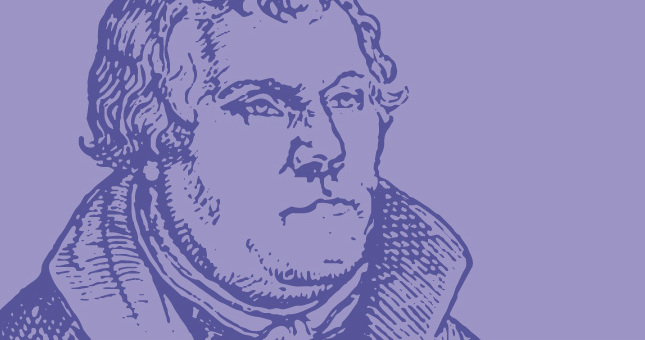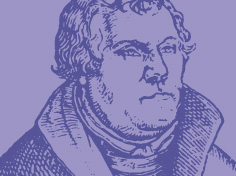
Martin Luther’s Reformation of Love
The Protestant Reformation began as a search for a new kind of consolation.
It’s a story that’s told often: Luther the troubled monk could find no enduring peace for his tortured conscience in the means of consolation available to him, including indulgences, and consequently came to hate the God who demanded so much from him in terms of righteousness. Luther then experienced a Reformation “breakthrough” while studying the Pauline corpus, especially Romans, in which he saw that we are justified not by good works but by grace through faith. Luther felt himself “born again” and came to regard God as his most loving Father who had given His Son to die for our sins and to be our righteousness. Central to Luther’s evangelical consolation was the certainty of forgiveness that came from basing one’s salvation on the sure foundation of the divine promises of the Word rather than on the shaky ground of one’s efforts to appease God.
This narrative is basically correct, although modern scholars have called into question the Damascus road-like quality of this account, arguing that Luther’s conversion experience was likely a protracted affair that consisted of several important Reformation breakthroughs rather than just a single all-encompassing one. But nearly every Luther scholar would agree that justification by faith was key to the evangelical solace that Luther discovered for himself and offered to others. I am interested in discerning what lay at the heart of justification by faith and therefore at the heart of Luther’s original evangelical insight that was so central for the Protestant Reformation as a whole.
We have to ask ourselves why Luther felt so guilty in the monastery, what was the source of his angst? One might answer, he thought he had to save himself through his own good works, that is, he believed he had to become righteous through his own efforts, and he knew he could not do so because he was so utterly convinced of his bondage to sin; therefore he despaired of salvation. This answer is also basically correct, but it overlooks a further question—what standard of righteousness did Luther think he had to live up to? What was the basic theological and existential problem he was trying to solve? If we can understand this problem, perhaps we can gain better insight into the nature of the solution that Luther proffered.
There is every reason to conclude that in keeping with his training as a monk and theologian, Luther would have answered this question by stating that righteousness consisted of the love of God above all things and the love of neighbor above oneself. That is, he thought God expected him to fulfill the two great commandments, and to do so perfectly and, at least initially, of his own accord. To understand the new consolation offered by Luther, one must appreciate that the source of his guilt-stricken conscience was the conviction that he was utterly incapable of responding to the immense demand for perfect, selfless love of God and neighbor that he found in Scripture. He believed that it was impossible for him to take a first step toward producing this love through his own efforts, as he had been taught. Luther’s basic problem was one of love.
Luther addressed this problem and its solution at the Heidelberg Disputation, which took place in 1518. He argued that God expects perfection from human beings, and perfection consists of loving God with a total will and of doing good out of complete and perfect love for God (LW 31: 61, 62). Luther allowed no modification or reduction of this standard—he was adamant that God expects us to love him perfectly with our entire being. He was also adamant that we are utterly incapable of doing so because we are enslaved to sinful self-love (LW 31: 63). Luther's solution was to posit God as the giver of a pure, unselfish, divine love that was able (gradually) to free human beings from self-love and allow them to become conduits of the divine love to others. One received this divine love through faith, which both covered one with Christ’s righteousness and caused Christ to dwell within one’s heart (LW 31:63).
Listen to how Luther spoke about divine love at the Heidelberg Disputation. In thesis 28 he asserts, “The love of God does not find, but creates that which is pleasing to it. The love of man comes into being through that which is pleasing to it.” In the explanation of the thesis Luther argues against the view that God’s love operates on the same principle as human love, insisting, “Rather than seeking its own good, the love of God flows forth and bestows good. Therefore sinners are attractive because they are loved; they are not loved because they are attractive” (LW 31: 57). I take this to be the real heart of Reformation consolation. If I had to point to one place that captures the true center of Reformation theology, it would be thesis 28 of the Heidelberg Disputation, although I would be quick to emphasize that for Luther this divine love comes to us in the most unexpected form, the crucified Christ (LW 31: 52-53). Luther thought that most if not all of the theology of his day taught that sinners had to make themselves attractive to God before God would bestow His love and grace on them, and sinners were capable of doing so. Inspired by the Apostle Paul and St. Augustine, Luther maintained that just the opposite was the case. For him, justification was the flowing forth of God’s love that loves the sinner as sinner and that renders the sinner attractive as sheer gift. The faith that receives this gift may be seen as a form of loving trust of God that confidently expects to receive all good things from His gracious hand. This faith is also a gift from God; it is does not arise from any inherent quality in the soul.
Viewing Luther’s central problem as an inability to fulfill the two great commandments helps to account for why he spends so much time in Reformation manifestos like The Freedom of the Christian on love of neighbor. He believed that his evangelical theology enabled one to truly love the neighbor as one received unmerited divine love through loving trust in God, which fulfilled the first commandment (LW 29:186). A big chunk of The Freedom of the Christian is given over to a consideration of neighbor-love. As Luther reflected on the Christ hymn in Philippians 2, he asserted, "…the good things [i.e., faith and righteousness] we have from God should flow from one to the other and be common to all, so that everyone should 'put on' his neighbor and so conduct himself toward him as if he himself were in the other's place. From Christ the good things have flowed and are flowing into us. He has so “put on” us and acted for us as if he had been what we are. From us they should flow to those who have need of them… This is true love and the genuine rule of a Christian life. Love is true and genuine where there is true and genuine faith" (LW 31: 371).
Luther posited a radical solution to a traditional problem. He argued that the way to enable fallen human beings like us to love God and neighbor is to assure us of God’s prior unconditional love for us in Christ, which frees us from our perceived need and ability to make ourselves lovable to God through our own efforts. Luther argued that once we experience the inflowing of this radical love into our hearts and lives, this love itself moves us to love God with childlike trust and to love our neighbor as we ourselves have been loved. At its best and at its heart, the Reformation was all about this reformation of love.
LW=Luther’s Works American Edition. Edited by J. Pelikan and H.T. Lehmann. 55 vols. St. Louis: Concordia Publishing House; Philadelphia: Fortress Press, 1955-.


